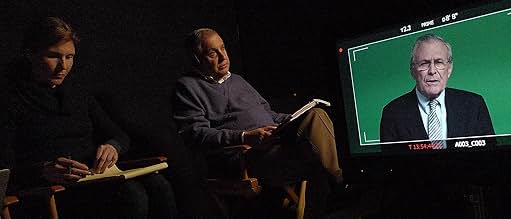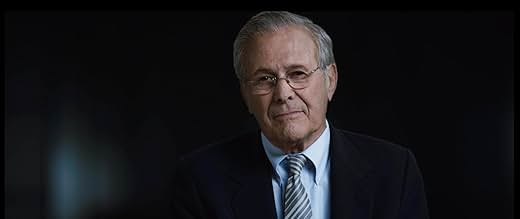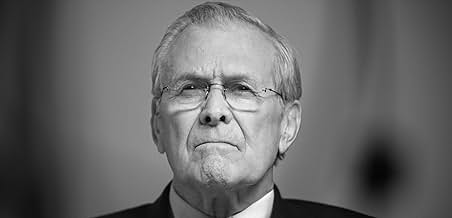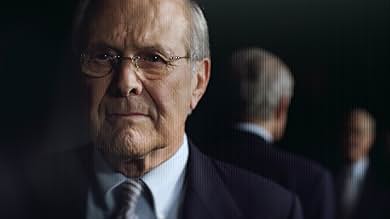NOTE IMDb
7,0/10
4,4 k
MA NOTE
Ajouter une intrigue dans votre langueFormer United States Secretary of Defense, Donald Rumsfeld, discusses his career in Washington D.C. from his days as a congressman in the early 1960s to planning the invasion of Iraq in 2003... Tout lireFormer United States Secretary of Defense, Donald Rumsfeld, discusses his career in Washington D.C. from his days as a congressman in the early 1960s to planning the invasion of Iraq in 2003.Former United States Secretary of Defense, Donald Rumsfeld, discusses his career in Washington D.C. from his days as a congressman in the early 1960s to planning the invasion of Iraq in 2003.
- Réalisation
- Scénario
- Casting principal
- Récompenses
- 2 victoires et 10 nominations au total
Avis à la une
Famously rigorous filmmaker Errol Morris sits a subject in front of him and the subject won't budge. This is, unfortunately, the takeaway from this documentary - a tremendous disappointment of a film in some way, but an extraordinary documentation of psychosis in another.
Rumsfeld apparently so annoyed Morris with his crafty replies that the director felt it necessary to follow up his film with a wild press tour apologizing for it - including a four part investigation into Rumsfeld's evasiveness in a New York times op-ed. In another article he called this film 'a horror movie'.
And it's understandable. Those who were against the wars in Iraq and Afghanistan will be infuriated- it gives us no new answers as to the motives behind the wars, no candid insights into Rumsfeld's tenure, and instead presents us with the same smirking blur of a man that we all got to know from his press conferences. Without a glint of uncertainty in his eye, he repeats essentially the same shtick as he always has. Direct questions are deflected with a grin and a wave.
Indeed, nobody deserves to be investigated more than Rumsfeld or his former compatriots, and Morris would ordinarily be the man to do it. But for an encounter to take place between two people, both need to be there. In this case one was absent. Those expecting a one on one - a whittling away towards the real substance - will leave empty handed because Rumsfeld is a ghost. There ain't nothing there. We've all been punk'd.
Rumsfeld apparently so annoyed Morris with his crafty replies that the director felt it necessary to follow up his film with a wild press tour apologizing for it - including a four part investigation into Rumsfeld's evasiveness in a New York times op-ed. In another article he called this film 'a horror movie'.
And it's understandable. Those who were against the wars in Iraq and Afghanistan will be infuriated- it gives us no new answers as to the motives behind the wars, no candid insights into Rumsfeld's tenure, and instead presents us with the same smirking blur of a man that we all got to know from his press conferences. Without a glint of uncertainty in his eye, he repeats essentially the same shtick as he always has. Direct questions are deflected with a grin and a wave.
Indeed, nobody deserves to be investigated more than Rumsfeld or his former compatriots, and Morris would ordinarily be the man to do it. But for an encounter to take place between two people, both need to be there. In this case one was absent. Those expecting a one on one - a whittling away towards the real substance - will leave empty handed because Rumsfeld is a ghost. There ain't nothing there. We've all been punk'd.
Donald Rumsfeld and Errol Morris are two senior men, not lacking success and self-esteem, Errol offering an audience and to Donald, to re-write his Historie.
What usually interests the film-maker is how people try so hard not to see the truth. Interesting angle. The movie was born from the numerous memos from Donald Rumsfeld, also a good Start!
The movie has a high quality production and the effects are great, the soundtrack is pervasive that is where all begins. It is produced like a Hollywood movie and formally gives the impressions of deepness. As spectator, it is embarrassing to see this long PR-Advertisement. Rumsfeld knows how to behave in front of a camera. He knows how to confuse, using pseudo-philosophical generalizations like The "unknown known". Unfortunately, the story-telling is full of inaccuracies and lies. The spectator is left alone, without anybody to counters or explains the infatuations of this guy.
Irak had been invaded because the FBI was delivering wrong information? I invite you to watch the movie "Fair Game" instead of "the Unknown Known" Rumsfeld pronounces the name of Dick Cheney, I would have wished his view about the privatization of the war through companies like Halliburton and Blackwater.
I wish I would have not seen this propaganda-movie. The only thing I learnt is to avoid the next movies from Errol Morris.
What usually interests the film-maker is how people try so hard not to see the truth. Interesting angle. The movie was born from the numerous memos from Donald Rumsfeld, also a good Start!
The movie has a high quality production and the effects are great, the soundtrack is pervasive that is where all begins. It is produced like a Hollywood movie and formally gives the impressions of deepness. As spectator, it is embarrassing to see this long PR-Advertisement. Rumsfeld knows how to behave in front of a camera. He knows how to confuse, using pseudo-philosophical generalizations like The "unknown known". Unfortunately, the story-telling is full of inaccuracies and lies. The spectator is left alone, without anybody to counters or explains the infatuations of this guy.
Irak had been invaded because the FBI was delivering wrong information? I invite you to watch the movie "Fair Game" instead of "the Unknown Known" Rumsfeld pronounces the name of Dick Cheney, I would have wished his view about the privatization of the war through companies like Halliburton and Blackwater.
I wish I would have not seen this propaganda-movie. The only thing I learnt is to avoid the next movies from Errol Morris.
Errol Morris tackles another former United States Secretary of Defense in Donald Rumsfeld with an in-depth interview. It starts mainly on the invasion of Iraq but covers his entire Washington career and his personal life. The Iraq stuff is not anything new especially if one had paid attention. Rumsfeld is as evasive as ever. His earlier work for previous Presidents holds some interest inside stories. The obvious comparison is Errol Morris' masterpiece "The Fog of War". In that one, Robert McNamara is much less a politician and more of a wise elder lamenting mistakes. That is a much more compelling watch. This one is an extended Sunday morning political talk show and a simple biodoc of Rumsfeld's career. Errol Morris' views are obvious from his questioning. The history is informative but nothing shocking. Maybe in another twenty years, Rumsfeld will have something more interesting and surprising to say.
I have rarely been so perplexed by a documentary film as by this one. It is 102 minutes long, and for much of that time Donald Rumsfeld is talking to the director/interviewer Errol Morris. However, despite that, I now feel that I know less about Donald Rumsfeld than I did before I saw the film. I almost preferred him as an unknown unknown to what he now is, an unknown known. Rumsfeld manages to talk endlessly in what appears to be a very candid way, without ever really saying anything. A few salient facts do emerge, but only a few. The most surprising one to me was the revelation that he and George Bush Senior evidently detest one another, although Rumsfeld thinks very highly indeed of 'W'. I also did not realize until I saw this film that Rumsfeld and Dick Cheney are so close, and worked together for so many years, that they are like brothers. However, a slight trace of vanity appeared throughout the film as Rumsfeld was always very careful to describe Cheney on several occasions as 'my deputy'. Just in case little brother got any big ideas about forgetting who was the older brother, I suppose. Cheney was indeed Rumsfeld's deputy for a long time in office. When Cheney became Vice President, it was Cheney who recommended to George W. that Rumsfeld be made Secretary of Defence. So yes, some facts did emerge, and they are interesting. As for Rumsfeld himself, he remains an enigma in the highest degree. I was surprised to discover how astonishingly intelligent Rumsfeld was. One does not normally expect to find that in a public figure. But the most interesting aspect of Rumsfeld's personality is that a sense of ironical whimsicality seems to pervade everything he says, thinks, and does. Those grins that he makes are not normal grins, they are grins at the ironical whimsicality of situations and events. They are an invitation to those watching him to share his sense of irony and delight. Rumsfeld's grins do not say, as most grins do: 'Hello, I'm very friendly,' they say instead: 'Isn't that wonderfully whimsical, and don't you want to grin with me about it?' In other words, Rumsfeld is not like other men. I had no idea that Rumsfeld had commenced working in the executive branch of the Government during the Kennedy Administration, having previously been a congressman. This film says nothing whatever of his business activities, and does not mention his launching of the agricultural chemical spray Roundup upon the world, which in some opinions was an act more serious than the Iraq War, and may cause more deaths (deaths which cannot be defended on any 'just cause' basis, as the cause was only making money). No one could appear to cooperate more in making a film about himself than Donald Rumsfeld did, but the feeling afterwards is that he is a master at appearing to be transparent while all the while surrounding himself in a cloud of ink like an octopus. People often joke about eating Chinese food (in a bad Chinese restaurant), when they consume a lot but feel hungry immediately afterwards. Well! Where is the real meat on Rumsfeld, or is he all grissle? Nor is there any fat to chew on, only snowflakes. This man is a mystery, truly he is.
Donald Rumsfeld, The Unknown Known, and his Lifetime of Service to War
The Unknown Known is the latest documentary from Errol Morris. Like his interviews with Robert McNamara in his film Fog of War, he interviews another architect of war, this time the Second Iraq War.
Unlike former Secretary of Defense Robert McNamara who pushed a continuation of the Vietnam conflict when he was in office, Donald Rumsfeld is not apologetic about his role in sending Americans off to die overseas. In his book In Retrospect, McNamara states in Time Magazine, "We were wrong, terribly wrong. We owe it to future generations to explain why."
Rumsfeld has no apologies to make, according to the man himself. And he learned no lesson from Vietnam except, as he would say, "it was a failure of imagination" that we lost in Vietnam.
Even Nixon apologized about his mistakes when talking to David Frost.
I am sure Director Morris was under legal contract not to ask tough, direct questions of Rumsfeld. Thus, he let Rumsfeld indict himself. Rumsfeld is narcissistic and unapologetic about the Second Iraq War. He sees no wrong in making the U.S. strong militarily regardless in how that strength is used. He does not, in The Unknown Known, see that the Second Iraq War was based on lies at all. He sees no lies. He submits that Saddam Hussein and Iraq did have WMDs, we just couldn't find them. He believes the U.N. weapons inspectors were duped and needed to keep looking. He does not agree that water boarding is torture, no matter what Human Rights Watch and others say. He sees know wrong except in our "failure of imagination."
Rumsfeld is a master of Newspeak, using phrases like "peace through strength", and "weakness is provocation." This all comes out in the movie, and it was no surprise to most of the audience. He lives in a world of lies, and the person he deludes the most is himself. Rating: Rent it. It is worth a view, and I would love to say that you should see it multiple times.
But there are no dramatic revelations in the movie, no sense of awaking. In fact, the lesson is that a beltway insider has many ways to deny the suffering of others, especially those we kill thousands of miles away for no cause. Rumsfeld sees war not as a destination, but a journey. As long as the U.S. stays on that journey, he is happy.
Peace, Tex Shelters
The Unknown Known is the latest documentary from Errol Morris. Like his interviews with Robert McNamara in his film Fog of War, he interviews another architect of war, this time the Second Iraq War.
Unlike former Secretary of Defense Robert McNamara who pushed a continuation of the Vietnam conflict when he was in office, Donald Rumsfeld is not apologetic about his role in sending Americans off to die overseas. In his book In Retrospect, McNamara states in Time Magazine, "We were wrong, terribly wrong. We owe it to future generations to explain why."
Rumsfeld has no apologies to make, according to the man himself. And he learned no lesson from Vietnam except, as he would say, "it was a failure of imagination" that we lost in Vietnam.
Even Nixon apologized about his mistakes when talking to David Frost.
I am sure Director Morris was under legal contract not to ask tough, direct questions of Rumsfeld. Thus, he let Rumsfeld indict himself. Rumsfeld is narcissistic and unapologetic about the Second Iraq War. He sees no wrong in making the U.S. strong militarily regardless in how that strength is used. He does not, in The Unknown Known, see that the Second Iraq War was based on lies at all. He sees no lies. He submits that Saddam Hussein and Iraq did have WMDs, we just couldn't find them. He believes the U.N. weapons inspectors were duped and needed to keep looking. He does not agree that water boarding is torture, no matter what Human Rights Watch and others say. He sees know wrong except in our "failure of imagination."
Rumsfeld is a master of Newspeak, using phrases like "peace through strength", and "weakness is provocation." This all comes out in the movie, and it was no surprise to most of the audience. He lives in a world of lies, and the person he deludes the most is himself. Rating: Rent it. It is worth a view, and I would love to say that you should see it multiple times.
But there are no dramatic revelations in the movie, no sense of awaking. In fact, the lesson is that a beltway insider has many ways to deny the suffering of others, especially those we kill thousands of miles away for no cause. Rumsfeld sees war not as a destination, but a journey. As long as the U.S. stays on that journey, he is happy.
Peace, Tex Shelters
Le saviez-vous
- AnecdotesThis same director also made Fog of War, a similar film that featured an extensive interview with Vietnam-era Secretary of Defense, Robert McNamara. Both films were highly critical of their lead subjects management of war.
- Crédits fousIvan & Boris
- ConnexionsFeatured in At the Movies: Venice Film Festival 2013 (2013)
- Bandes originalesWhite Christmas
Written by Irving Berlin
Performed by Tennessee Ernie Ford
Courtesy of Capitol Records Nashville under license from Universal Music Enterprises
Meilleurs choix
Connectez-vous pour évaluer et suivre la liste de favoris afin de recevoir des recommandations personnalisées
- How long is The Unknown Known?Alimenté par Alexa
Détails
- Date de sortie
- Pays d’origine
- Langue
- Aussi connu sous le nom de
- Donald Rumsfeld: certezas desconocidas
- Sociétés de production
- Voir plus de crédits d'entreprise sur IMDbPro
Box-office
- Montant brut aux États-Unis et au Canada
- 276 497 $US
- Week-end de sortie aux États-Unis et au Canada
- 64 315 $US
- 6 avr. 2014
- Montant brut mondial
- 301 604 $US
- Durée
- 1h 43min(103 min)
- Couleur
- Mixage
- Rapport de forme
- 2.35 : 1
Contribuer à cette page
Suggérer une modification ou ajouter du contenu manquant





























